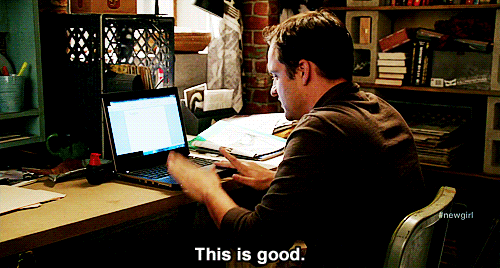Let me guess: You hopped on the internet hoping to spark motivation after a long fight with writer’s block. I’m not just a writer, I’m also a mind reader. Or, maybe I’ve experienced it before. In fact, I’m currently in it. I had planned on writing a list about the various topics to write about when you feel stuck and how to overcome writer’s block. Funny enough, my own writer’s block crept up like an approaching tidal wave that left my brain spinning. I scoured the internet for ideas, but the excessive amount of information left me feeling overwhelmed. What tips do I include? Exclude? What do people want to know? Every college student feels pressure to complete assignments with flawless effort. Apprehension towards your work opens the door for writer’s block like a compromised immune system opens the door for disease.
Before you come down with a bad case, I know a trick to lessen your writing anxiety.

As an English major, I experience my fair share of heavy-writing assignments. After every completed task, I ask myself how I could ever write another sentence again. That little breath you inhale between finishing an assignment and welcoming the next one seems to get shorter and shorter each time. No joke, writer’s block throws you for a loop. Adverse circumstances prevent us from chipping at the creativity block and composing the next Odyssey.
How do we start our writing journey?

A few years back (way before college) I volunteered for a counselor-in-training program conducted at a community college. Not only did I benefit from volunteer hours, but I re-discovered the joy of learning. Not receiving a grade for my work definitely played a part in the thrill, but I chose classes that interested me. Remember the tidbit about personal interest for later. I took one class called Journaling. In that class, our instructor made it a priority to set aside the first 10 minutes of class for free writing. Freewriting consists of writing nonstop, whatever-comes-to-mind, grammar-totally-thrown-out-the-window thoughts for an allotted amount of time. I never experienced free writing before, so imagine my adjustment struggle when I finally put the pencil to paper. At first, it feels exhilarating because you’ve finally received time to blurt out all your thoughts. Yet, you quickly realize you blurted out everything in your head in two minutes flat.
Now, what do you write for the next 8 minutes?
I noticed my pencil hovering over the blank space next to my last thought as I froze in contemplation. The instructor’s voice rang out in the quiet room, “Keep writing, guys.” I felt like a deer in the headlights, so I resorted to doodling. I wanted to try the exercise in its entirety though, so the next class I made it a point to continue writing even when I felt depleted of content. As I wrote nonstop nonsense, I felt like a mad scientist on the verge of a scientific breakthrough. Each new line often sprouted a pair of legs and ran off before evolving into a complete creation. The point in free writing: No rules, no regulations, no finished thoughts, no problem.
I experienced complete liberation.

When I approach writer’s block, I decide to maniacally write every thought down with no regard to substance, grammar or preciseness. Take a step back from your topic and before you write, just write. Now you may think, “I just read through this entire article and all I need to do is write? That’s exactly my problem! I can’t write.” I know, I know. Hear me out. Your brain needs time to unclog. Right now, writing anxiety overpowers your thinking processes. To fight this, Lawrence Oliver famously proposed a method of essentially writing out your writer’s block. As students we feel constricted by guidelines, wondering how to write for other people–also known as your professors.
Simply put, write for yourself.

You have an opinion (whether you admit it or not) so share it! Jot down your feelings on the topic without going back and overthinking or editing. Unleash the word vomit built up in your skull to allow for some clarity. You might surprise yourself when you discover substantial thoughts worth building on in that word-jumble of yours. Throughout the years, I have discovered writing comes from a place of genuine intrigue. Discover what intrigues you about your topic, detailing specific aspects and explaining why. Most importantly, reveal your truth instead of suppressing your thoughts. Confining yourself to what you think people want to hear only adds to your writing anxiety. Often times, professors want to know your real thoughts in your analyses. Don’t overthink, just do.



















